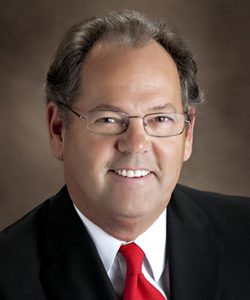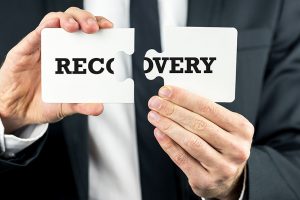 By Dean Bachelor, Founder
By Dean Bachelor, Founder
It was the late 1980’s. I was having lunch with the president of a bank in Red Wing, Minn., at the St. James Hotel, the landmark hotel founded by 11 civic-minded businessmen in 1875. I had just stepped into the role of CEO at Durkee-Atwood, the town’s second largest employer (Red Wing Shoe employed 500+ and Durkee-Atwood had 325 employees).
Located in a 100,000+ square-foot-plant located on the banks of the Mississippi River, this family-owned company had manufactured rubber belts for almost 100 years. If you owned a John Deere lawn mower, they made the belt that powered that mower. If your mother owned a Singer sewing machine, they made that small belt that allowed the needle to move up and down as she stitched the hem in your sister’s dress. If you drove to a Western Auto to purchase a new fan belt for your car because your car was overheating, Durkee-Atwood made that belt.
The board of directors had hired me to turn the company around after it had posted huge losses in the previous several years. This pillar in the community was in serious trouble.
The banker was solemn during that lunch. He had seen the company’s balance sheet. And although this family-owned business had survived for nearly a century, Durkee-Atwood was about to collapse under the weight of its own debt held by a St. Paul bank that was about to foreclose. He looked at me and said, “Dean, I trust you understand the importance of what you are doing. I have more than 300 of your employees as customers of my bank (in the late 80’s, there were only two banks in Red Wing and his was the most prominent). Our bank has home mortgages, auto loans, snowmobile loans, home improvement loans – you name it – we have it. And if this company closes its doors, this town may not survive. The ripple effect of losing hundreds of jobs in this small town would be hard to recover from.” The stories I remembered my grandfather sharing about the Great Depression came to mind.
 When I am solving a problem, I find it helpful to write it down and start writing out solutions. I went home that night and penned a new mission statement for Durkee-Atwood. A Mission Statement is designed to answer the questions, “Why are we doing what we are doing?”, “What is our purpose?” and “What is our Mission?” Every organization needs to ask these questions and spend time arriving at the answer. The rubber belt company had initiated a strategy five years earlier focused on diversification. During those five years, the company had gotten itself into all kinds of businesses that had nothing to do with belts. And that strategy nearly killed it – and its 325 jobs that supported Red Wing’s economy. I needed a way to engage the employees and focus their attention on something other than the next union negotiation.
When I am solving a problem, I find it helpful to write it down and start writing out solutions. I went home that night and penned a new mission statement for Durkee-Atwood. A Mission Statement is designed to answer the questions, “Why are we doing what we are doing?”, “What is our purpose?” and “What is our Mission?” Every organization needs to ask these questions and spend time arriving at the answer. The rubber belt company had initiated a strategy five years earlier focused on diversification. During those five years, the company had gotten itself into all kinds of businesses that had nothing to do with belts. And that strategy nearly killed it – and its 325 jobs that supported Red Wing’s economy. I needed a way to engage the employees and focus their attention on something other than the next union negotiation.
When the employees walked into the rubber plant a few days later, a large 10’ X 20’ vinyl sign hung from the rafters of the plant. Big, bold words “We Make Belts” stood as a testament to the company’s new mission statement. And over the next few months, we spun off, sold and/or closed down everything except the belt operation as we focused on the company’s core strength – manufacturing belts – and the pride of craftmanship these hard-working employees had developed over the years.
The project in Red Wing led to me to the realization that the work we do at Platinum Group is meaningful. It’s meaningful because our work often leads to companies being brought back from closing their doors and losing jobs in the community – to healthy, profitable businesses that save jobs and create more jobs. Durkee-Atwood was saved. The company went from losing millions of dollars to earning millions and paying out all-employee bonuses of more than a quarter million per year during the three years I was there. That’s Meaningful. Not just to the employees and their families, but to the community in which they live as they spend their hard-earned wages.
The words of that banker during our lunch also helped me to understand the importance of Capitalism in America: The ability to earn an honest profit in our business dealings provides the impetus to generate wealth that enables an economy to thrive in both small towns like Red Wing, as well as large cities throughout the country.
Fast forward a decade. My partners at Platinum Group and I were about to attend our two-day annual planning session at a retreat center north of the Twin Cities. And one of the topics that we discuss each year is our firm’s Mission Statement. The firm was growing and we needed a new mission statement to help motivate us toward something bigger than ourselves. Sitting in my home office in the middle of the night, I remembered that luncheon with the banker from Red Wing and felt compelled to frame our firm’s mission using the words Meaningful Capitalism™.
Fast forward another two decades to 2021. This country just experienced one of the most difficult years in history. COVID-19 closed thousands of businesses throughout America. From having the lowest unemployment rate in 50 years to losing 22 million jobs in two months during the spring of 2020, the U.S. has watched more than 15,500 retail stores close and more than 100,000 businesses nationwide call it quits. And even though the politicians in Washington, D.C., have attempted to provide support in the form of stimulus and loans, what was the strongest U.S. economy in decades has been set back on its heels. People are hurting, both financially and emotionally.
My hope and prayer is that our country will recover in meaningful ways. And that as we do, we’ll remember what built it into the most productive, wealthy nation in the world: innovation and creativity of the American entrepreneurial spirit, business savvy, and the values of caring about each other and our communities that have united and guided us throughout our history as Americans.
